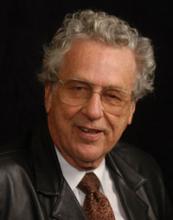Charles Perrow receives 2019 Distinguished Career Award

The Henry Koerner Center is pleased to announce that Charles Perrow, Professor Emeritus of Sociology, received the 2019 Distinguished Career Award from the American Sociological Association. The award celebrates a career of contributions to the area(s) of organizations, occupations, and/or work and recognizes the depth and breadth of scholarly impact over an extended time and across multiple projects.
Charles Perrow (Ph.D., University of California, Berkeley, 1960) is a past Vice President of the Eastern Sociological Society; Fellow of the Center for Advanced Study in the Behavioral Sciences, 1981-2, 1999; Fellow of the American Academy for the Advancement of Science; Resident Scholar, Russell Sage Foundation, 1990-91; Fellow, Shelly Cullom Davis Center for Historical Studies, 1995-96, Princeton University; Visitor, Institute for Advanced Studies, 1995-96, Princeton, NJ; former member of the Committee on Human Factors, National Academy of Sciences of the Sociology Panel of the National Science Foundation; Visiting Fellow/Visiting Professor, Center for International Security and Cooperation, Stanford University, 2004-18; and served on the editorial boards of several journals. An organizational theorist, he is the author of six books, including: The Radical Attack on Business (1972); Organizational Analysis: A Sociological View (1970); Complex Organizations: A Critical Essay (1972; 3rd ed., 1986); Normal Accidents: Living with High-Risk Technologies (1984; revised, 1999); The AIDS Disaster: The Failure of Organizations in New York and the Nation (1990) with Mauro Guillen; Organizing America: Wealth, Power, and the Origins of American Capitalism (2002); as well as over 50 articles. His interests include the development of bureaucracy in the 19th century, the radical movements of the 1960s, Marxian theories of industrialization and of contemporary crises, accidents in such high-risk systems as nuclear plants, air transport, DNA research and chemical plants, protecting the nation’s critical infrastructure, the prospects for democratic work organizations, and the origins of U.S. capitalism.